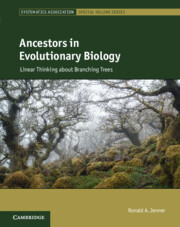Book contents
- Ancestors in Evolutionary Biology
- The Systematics Association Special Volume Series
- Ancestors in Evolutionary Biology
- Copyright page
- Dedication
- Contents
- Acknowledgments
- 1 A History of Narrative Phylogenetics
- 2 From Archetypes to Ancestors
- 3 The Emergence of Lineage Thinking
- 4 Ernst Haeckel’s Evolutionary Storytelling
- 5 The Epistemic Rise of Hypothetical Ancestors
- 6 Intuiting Evolution
- 7 Telling Straight Stories with Fossils
- 8 Seeing Animal Ancestors in Embryos
- 9 Ancestral Attractions and Phylogenetic Folklore
- 10 Narrative Shortcuts and Phylogenetic Faux Pas
- 11 Taxic Distortions of Lineage Thinking
- 12 Making Sense with Stories
- References
- Index
- Systematics Association Special Volumes
11 - Taxic Distortions of Lineage Thinking
Published online by Cambridge University Press: 08 July 2022
- Ancestors in Evolutionary Biology
- The Systematics Association Special Volume Series
- Ancestors in Evolutionary Biology
- Copyright page
- Dedication
- Contents
- Acknowledgments
- 1 A History of Narrative Phylogenetics
- 2 From Archetypes to Ancestors
- 3 The Emergence of Lineage Thinking
- 4 Ernst Haeckel’s Evolutionary Storytelling
- 5 The Epistemic Rise of Hypothetical Ancestors
- 6 Intuiting Evolution
- 7 Telling Straight Stories with Fossils
- 8 Seeing Animal Ancestors in Embryos
- 9 Ancestral Attractions and Phylogenetic Folklore
- 10 Narrative Shortcuts and Phylogenetic Faux Pas
- 11 Taxic Distortions of Lineage Thinking
- 12 Making Sense with Stories
- References
- Index
- Systematics Association Special Volumes
Summary
In this chapter I address flaws in lineage thinking that are common in the professional, popular, and eductional literature, and which result from confusing the branching relationships between collateral relatives in the realm of systematics with the linear relationships between ancestors and descendants in the realm of evolutionary descent. The influential voices of the late Stephen Jay Gould and Robert O’Hara, who dubbed the now ubiquitous phrase ‘tree thinking’, have warned readers for decades against the sins of linear evolutionary storytelling and the use of linear evolutionary imagery. However, I argue that their impact has been deeply pernicious. The writings of Gould and O’Hara fundamentally misconstrue the relationship between the branching realm of systematics and the linear realm of evolving lineages. I close with a discussion of the problem that, in the absence of a vocabulary designed to talk about lineages, we are forced to discuss them in the taxic language of systematics. This inevitably causes problems.
Keywords
- Type
- Chapter
- Information
- Ancestors in Evolutionary BiologyLinear Thinking about Branching Trees, pp. 298 - 326Publisher: Cambridge University PressPrint publication year: 2022

